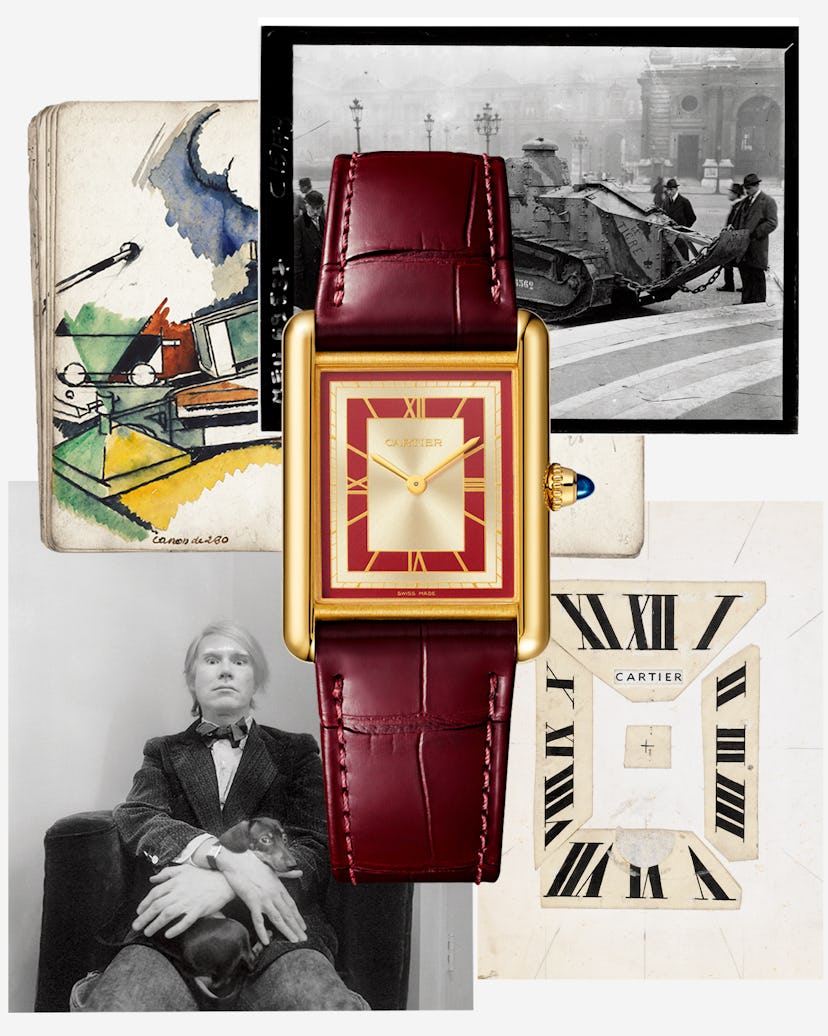How the Cartier Tank Watch Became a Forever Classic

Fittingly for a watch owned by Andy Warhol—who famously never wound his, explaining that he didn’t wear it to tell the time, but “because it is the watch to wear”—the Cartier Tank continues to outlive its 15 minutes of fame.
Andy Warhol, 1973.
© Arnold Newman Properties/Getty Images, used with permission from the Andy Warhol Foundation for the Visual Arts, Inc.
An enduring token of luxury and refinement, the Tank has been part of the canon of Very Important Objects since it was created in 1917—the ultimate dress watch for connoisseurs and aesthetes of all stripes. According to Cartier lore, it was inspired by the aerial view of a World War I combat vehicle; the lightweight case resembled a moving turret, and the flanks represented wide treads on either side of the hull. The Tank’s design was unabashedly modern: Punctuated with blued-steel hands, Belle Époque Roman numerals, and a sapphire cabochon on the crown, its rectangular face was a radical break from the traditional round shapes of the time. In the ensuing decades, the watch became an emblem for an enviable list of movers and shakers, from Cary Grant to Muhammad Ali to Princess Diana. More recently, rapper Tyler, the Creator went from wearing an $11 Casio to amassing a serious Cartier collection as part of his glow-up; and in 2017, Kim Kardashian reportedly paid $379,500 at auction for a vintage version once owned by Jacqueline Kennedy Onassis.
The Tank watch was inspired by the design of World War I vehicles such as this one, nicknamed “Le Tigre,” photographed in Paris in October 1918.
National Library of France.
“Today’s generation is obsessed with nostalgia, but I think gender also plays a big role,” says Brynn Wallner, who worked as a multimedia producer at Sotheby’s and who founded Dimepiece, a new platform dedicated to women’s watches. She points to Cartier’s historical gender neutrality and relatively small watch faces as reasons for the Tank’s current resonance. According to Pierre Rainero, Cartier’s director of image, style, and heritage, the Tank’s longevity is by design. “We like projects that open doors, not dead-end stories or designs,” he explains. “As Louis Cartier [the visionary grandson of the maison’s founder] liked to say, we like idées mères, or mother ideas, that give birth to other ideas.”
The updated Tank Louis Cartier, in 18-karat yellow gold.
Vincent Wulveryck, © Cartier.
To that end, in the past century, Cartier has pushed out a platoon of variations on the Tank, elongating, squaring off, and even contorting the original face into amorphous shapes that recall Dalí’s melting clocks. Everything from steel bracelets to limited-edition skeleton cases and faux leather straps, made from apple refuse, has been added as extensions to its uniquely elastic design. These experiments in geometry and taste have not only kept the Tank up to date with technology and the zeitgeist, but also set new trends. (The Tank à Guichet, from 1928, which did away with a traditional dial and revealed the hours and minutes through two small openings within a solid gold face, predates similar designs, including the Gucci Grip, by almost a century.)
A sketch for a Tank watch, 1930.
Cartier London Archives, © Cartier.
The Cartier store on Place Vendôme, Paris.
Ludovic Marin/AFP via Getty Images.
Recently, the brand released a slew of updates on the new Tank Must (the original Les Must de Cartier Tanks were launched in 1977 as affordable alternatives to Cartier’s precious models), as well as two reprised versions of the Tank Louis Cartier, in blue with rose gold, and red with yellow gold (shown above). These relatively accessible timepieces are sure to lure new devotees to the Cartier universe. Add to that the fact that rare iterations continue to set records at auction (a vintage “Crash,” a model made by Cartier’s erstwhile London outpost in the 1960s and favored by Kanye West, Jay Z, and Tyler, the Creator, recently sold for close to $1 million), and it becomes clear that the Tank’s charm offensive is unlikely to abate anytime soon.
Cubist renderings of wartime machinery, such as André Mare’s Le Canon de 280 Camouflé, Extrait du Carnet 2, 1916, also served as inspiration for the timepiece.
Archives André Mare/IMEC.